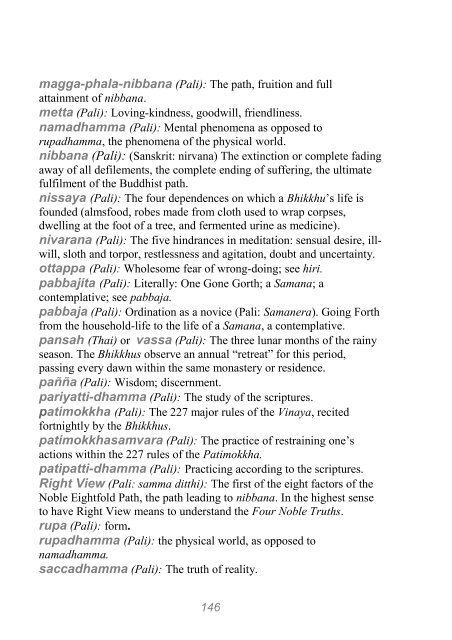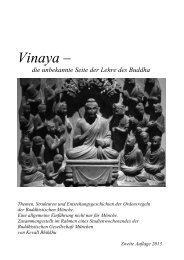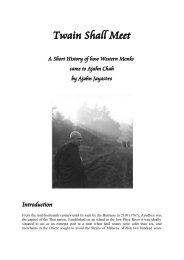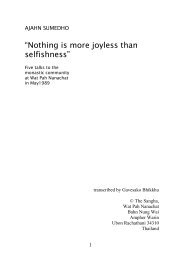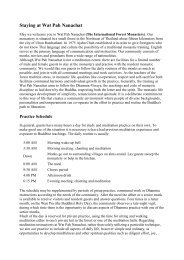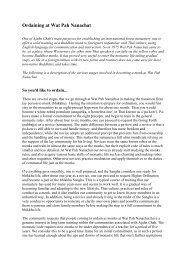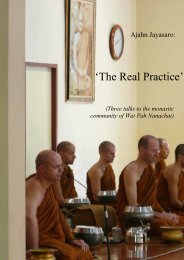Luang Por Liem: The Ways of the Peaceful - Wat Pah Nanachat
Luang Por Liem: The Ways of the Peaceful - Wat Pah Nanachat
Luang Por Liem: The Ways of the Peaceful - Wat Pah Nanachat
Create successful ePaper yourself
Turn your PDF publications into a flip-book with our unique Google optimized e-Paper software.
magga-phala-nibbana (Pali): <strong>The</strong> path, fruition and full<br />
attainment <strong>of</strong> nibbana.<br />
metta (Pali): Loving-kindness, goodwill, friendliness.<br />
namadhamma (Pali): Mental phenomena as opposed to<br />
rupadhamma, <strong>the</strong> phenomena <strong>of</strong> <strong>the</strong> physical world.<br />
nibbana (Pali): (Sanskrit: nirvana) <strong>The</strong> extinction or complete fading<br />
away <strong>of</strong> all defilements, <strong>the</strong> complete ending <strong>of</strong> suffering, <strong>the</strong> ultimate<br />
fulfilment <strong>of</strong> <strong>the</strong> Buddhist path.<br />
nissaya (Pali): <strong>The</strong> four dependences on which a Bhikkhu’s life is<br />
founded (almsfood, robes made from cloth used to wrap corpses,<br />
dwelling at <strong>the</strong> foot <strong>of</strong> a tree, and fermented urine as medicine).<br />
nivarana (Pali): <strong>The</strong> five hindrances in meditation: sensual desire, illwill,<br />
sloth and torpor, restlessness and agitation, doubt and uncertainty.<br />
ottappa (Pali): Wholesome fear <strong>of</strong> wrong-doing; see hiri.<br />
pabbajita (Pali): Literally: One Gone Gorth; a Samana; a<br />
contemplative; see pabbaja.<br />
pabbaja (Pali): Ordination as a novice (Pali: Samanera). Going Forth<br />
from <strong>the</strong> household-life to <strong>the</strong> life <strong>of</strong> a Samana, a contemplative.<br />
pansah (Thai) or vassa (Pali): <strong>The</strong> three lunar months <strong>of</strong> <strong>the</strong> rainy<br />
season. <strong>The</strong> Bhikkhus observe an annual “retreat” for this period,<br />
passing every dawn within <strong>the</strong> same monastery or residence.<br />
pañña (Pali): Wisdom; discernment.<br />
pariyatti-dhamma (Pali): <strong>The</strong> study <strong>of</strong> <strong>the</strong> scriptures.<br />
patimokkha (Pali): <strong>The</strong> 227 major rules <strong>of</strong> <strong>the</strong> Vinaya, recited<br />
fortnightly by <strong>the</strong> Bhikkhus.<br />
patimokkhasamvara (Pali): <strong>The</strong> practice <strong>of</strong> restraining one’s<br />
actions within <strong>the</strong> 227 rules <strong>of</strong> <strong>the</strong> Patimokkha.<br />
patipatti-dhamma (Pali): Practicing according to <strong>the</strong> scriptures.<br />
Right View (Pali: samma ditthi): <strong>The</strong> first <strong>of</strong> <strong>the</strong> eight factors <strong>of</strong> <strong>the</strong><br />
Noble Eightfold Path, <strong>the</strong> path leading to nibbana. In <strong>the</strong> highest sense<br />
to have Right View means to understand <strong>the</strong> Four Noble Truths.<br />
rupa (Pali): form.<br />
rupadhamma (Pali): <strong>the</strong> physical world, as opposed to<br />
namadhamma.<br />
saccadhamma (Pali): <strong>The</strong> truth <strong>of</strong> reality.<br />
146


